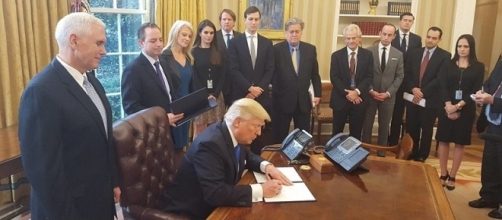Could the seemingly blase reaction of the American public to news of alleged trump campaign collusion with Russia be indicative of a problem in the body politic? There was a time, not so long ago, that rumors of backroom contacts between the White House and the Kremlin would have been enough to torpedo any candidate or initiative associated with it. U.S. citizens and policymakers don't like dealing with Russia, a country whose commitment to its commitments has long been suspect.
And that feeling appears to be mutual, as Russia rarely misses an opportunity to outmaneuver the U.S.
on the international stage in a manner eerily reminiscent of the Cold War between the two countries in the decades following World War II. But what explains the muted reaction of the American public to allegations that former National Security Advisor Michael Flynn, a retired Army lieutenant colonel who held that post for about a month before being forced to resign, actually discussed this country's future policies toward Moscow with a top Russian official?
World stature
Do you think the people of the United States don't care about Russia anymore? Admittedly, the giant county that includes significant portions of both Asia and Europe isn't what it used to be, not since those pesky European satellite nations veered off and invited more U.S.
aid and influence. But this is Russia, not too far removed from the old Soviet Union known for threatening international neighbors, imprisoning domestic opponents and barring residents from observing religious customs.
Remember hiding under desks and heading into fallout shelters at school? That was what the Russians were like. Of course, it turned out they didn't have close to the offensive military strength or advanced technology they professed to have. But they still have an arsenal of nuclear weapons that we and our allies have been good enough to modernize out of safety concerns.
Remember Chernobyl? That was the Russians, too.
Post-election depression?
Maybe U.S. residents are still shell-shocked from last year's hard-to-reconcile presidential campaign that ended in an unlikely victory for big-time businessman Donald Trump, a man who once hosted a reality television show but obviously has no hands-on government experience or temperament.
The rumbles and bluster coming from the Trump White House these days speak for themselves.
Why does Trump insist on cozying up to Russia and its autocratic leader, Vladimir Putin? Why did Trump break with a 50-year tradition and refuse to release his tax returns, which might have shown if he or his companies had financial ties to Moscow.
And why does Trump continue to let speculation fester about whether the Russians exerted undue influence on the outcome of the 2016 presidential race, when he could just declare himself in favor of transparency and order the federal government's investigatory agencies to sort it all out. Instead, the president did the precise opposite.
Isn't honesty and better government what the American people really want?

